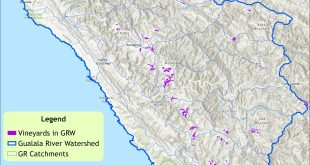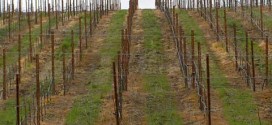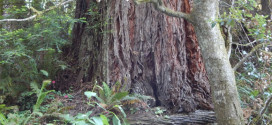Sierra Club, Sonoma Group August 18, 2005 “Close to Home” op-ed article in the Santa Rosa Press Democrat |
Forests in western Sonoma County are increasingly being converted to vineyards.
The number of acres being considered for conversion by the California Department of Forestry this year is greater than all conversions approved over the past decade, according to the county planning department. Often these forests are being cut down in order to produce high-end, boutique wine.
The consequences of these conversions can be disastrous for an already battered watershed – the Gualala. The Gualala River is impaired by high temperatures and sediment, and the area has been heavily overlogged in recent decades. It badly needs to rest and recover.
Besides loss of forest – which can never adequately be restored, once converted – these conversions pose grave dangers to our salmon streams, to the water table, to the forest habitat and wildlife, and to soils. Biologists and ecologists agree that conversion of forests to intensive agriculture causes fundamental changes in ecological and physical processes that maintain our wildlife and the beneficial qualities of water, land and air.
The urgency for strengthening forest protections comes from the number of recent applications to replace coastal redwood forest with vineyards in the west county. The largest ever such project in Northern California is now being designed on a 19,000-acre parcel in the Gualala River watershed. Proponents aim to convert 1,900 acres to vineyards. Forested acres on steep ridgetops are in peril of permanent conversion to intensive agriculture and “starter castle” residential development.
The project is cleverly named Preservation Ranch to disguise its true nature. The development team is headed by an entrepreneur from Napa, William Hill, and the funding is being supplied by the public employees of California through backing supplied in most part by CalPERS, the state body entrusted with investing their retirement savings.
Conversions are much more likely to happen if so-called “no net loss” measures are adopted by the Sonoma County Board of Supervisors.
The Planning Commission recently recommended to the board that no change be made in the current situation, but among the alternatives it considered adopting was the misleadingly named “no net loss option.”
We say misleading because that option actually allows for the loss of one-third of our forest land, provided that another two-thirds is protected. However, an acre of forest lost is an acre lost, and the standards of restoration envisioned are vague and inadequate. No thought at all was given in the option to the issue of habitat fragmentation, even though the Citizens Advisory Committee had recommended that protection measures be adopted.
In a nutshell, “no net loss” doesn’t add up. It is a misnomer and should more accurately be labeled “no net protection.”
The Sonoma County Grapegrowers Association recommended against the spurious “no net loss” option during the Planning Commission hearings. Sonoma County’s wine industry doesn’t need to reduce our forests to produce boutique wine. An excess of conversions could result in a wine glut, loss of tourism and a serious threat to the sustainable logging industry.
The Sierra Club urges the strongest protection for our forestlands so that future generations will never ask: “Why is Sonoma County part of the Redwood Empire?”
Instead, the remaining forests can be preserved, and we will have the concerned citizens of today to thank for that. We urge people to attend the Board of Supervisors hearing on Tuesday and to support “Option 3,” which will prohibit conversions except in cases of overriding public benefit. For more information go to www.redwood.sierraclub.org/sonoma.
 Friends of Gualala River Protecting the Gualala River watershed and the species living within it
Friends of Gualala River Protecting the Gualala River watershed and the species living within it


